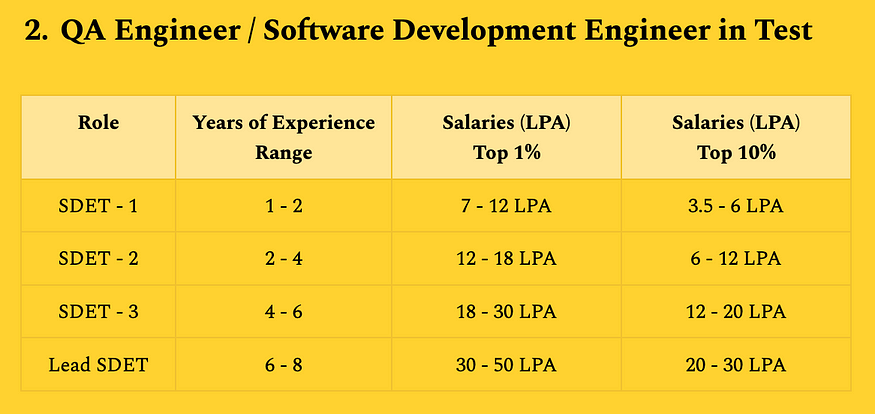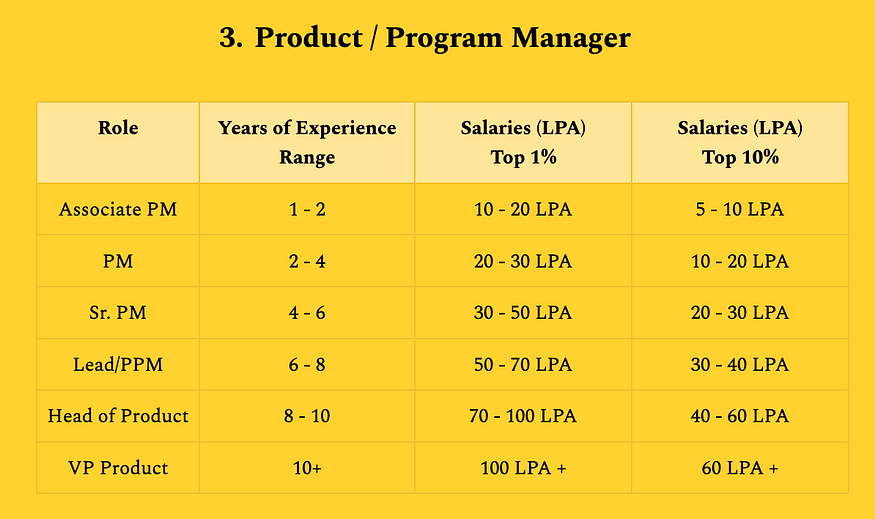Tech careers have been one of the most sought out choices for decades now. Complex problems, scale and impact attract the world’s best minds to this. Tech careers offer dynamic opportunities in a rapidly evolving landscape. From software development and data analysis to cybersecurity and AI research, these roles cater to diverse interests. Constant innovation demands continuous learning, making adaptability crucial. Tech careers promise both lucrative compensation and the chance to shape the future
Why are tech salaries at an all-time high?
Tech salaries are at an all-time high due to several factors –
- The increasing reliance on technology in various industries creates a high demand for skilled professionals.
- Shortages in specialised talent amplify competition among companies, driving up compensation to attract and retain top talent.
- Additionally, tech’s pivotal role in innovation and revenue generation justifies premium pay scales.
- Besides, tech remains the most heavily invested vertical by VCs and PE firms giving the companies access to huge capital. This translates to a constant battle among companies to get the best talent.
Higher salaries are not translating to better engineers!
- While higher salaries in tech can attract top talent, they might not always guarantee better engineers for a few reasons:
- Mismatch of Skills: Higher pay might attract individuals who are motivated primarily by compensation rather than a genuine passion for engineering. This can lead to a mismatch between skills and job requirements.
- Lack of Development: Simply offering a high salary doesn’t inherently foster skill development or innovation. Engineers need opportunities for learning, growth, and challenging projects to become better at what they do.
- Toxic Culture: Some high-paying tech companies might have toxic work cultures, which can hinder collaboration, creativity, and overall engineer improvement.
- Job Hopping: Engineers might switch jobs frequently solely for higher salaries, preventing them from gaining deep expertise and experience in one area.
- Focus on Short-Term Gains: If companies prioritize short-term profit over long-term investment in their engineers, they might not provide the necessary resources and support for skill enhancement.
- Inadequate Training: Offering a high salary doesn’t necessarily mean providing adequate training and mentorship, which are crucial for engineers to develop and excel.
- Lack of Autonomy: If engineers are restricted to specific tasks without autonomy and the ability to contribute ideas, their growth potential can be stifled.
- Burnout: A culture of overwork and burnout can result from the pressure to maintain high levels of productivity, negatively impacting the quality of engineering work.
To foster better engineers, a holistic approach that includes professional development, a positive work environment, challenging projects, and opportunities for creativity is essential, along with competitive compensation.
Demand vs Supply gap
The demand-supply gap in software engineering jobs arises from the exponential growth of technology across industries, generating a substantial need for skilled professionals. However, this demand often outpaces the available pool of qualified candidates. The scarcity of skilled engineers stems from the rapid evolution of technology, creating a mismatch between required skills and outdated educational curricula. This global challenge is further compounded by intense competition for talent among tech hubs and high turnover rates within the industry.
Addressing this gap involves multifaceted efforts. Coding boot camps, upskilling programs, and online learning platforms aim to quickly equip individuals with relevant skills to meet industry needs. Additionally, companies focus on investing in the training and development of current employees and fostering diverse talent pipelines to bridge the divide between demand and supply in the software engineering job market
Why do tech salaries don’t go down despite layoffs?
Tech salaries often don’t go down despite layoffs due to several reasons:
- High Demand for Skilled Talent: The tech industry consistently faces a shortage of skilled professionals, and this demand-supply gap persists even during layoffs. Companies need experienced engineers to maintain and innovate their products, driving competition for top talent and sustaining salary levels.
- Critical Role of Technology: Technology is crucial for businesses to stay competitive and innovative. Layoffs might be a strategic move to optimize operations, but companies still require skilled tech workers to support their core functions.
- Specialized Skills: Many tech roles require specialized knowledge and expertise, making it challenging to replace experienced professionals quickly. As a result, employers are often willing to pay premium salaries to retain and attract skilled engineers.
- Shortage of Qualified Candidates: Layoffs might be temporary for some companies, and when they recover, they need to rebuild their workforce quickly. The limited availability of qualified candidates can lead to bidding wars for top talent, driving salaries up.
- Innovation and Growth: Tech companies understand that investing in their workforce, even during challenging times, is essential for long-term growth and innovation. Competitive salaries help maintain employee morale and attract the best minds in the field.
- Industry Competition: The tech industry is highly competitive, with companies vying for market share and talent. Even during periods of layoffs, companies want to position themselves as attractive employers, which includes offering competitive compensation packages.
- Company Reputation: Maintaining competitive salaries, even during layoffs, helps companies protect their reputation as desirable workplaces. Drastic salary cuts can lead to negative perceptions among potential hires and the industry at large.
In summary, the combination of high demand for skilled professionals, specialized skills, competition for top talent, and the enduring need for innovation in the tech sector collectively contribute to the resilience of tech salaries, even in the face of layoffs.
Salary trend for various tech roles
India vs USA — Salary Trends
Salary growth rate(%) over last 5 years
Salary Benchmarking Report 2023 — India






PS. Want to share something —
-Sukant Kumar
Let’s talk; here is my calendly — https://calendly.com/sukantk/talk






